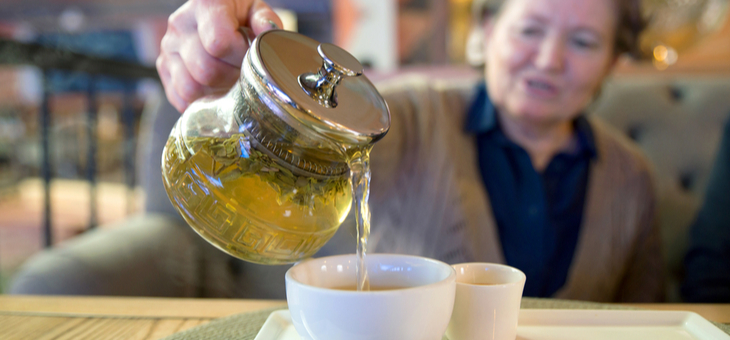High technology is being used to combat COVID-19, but university researchers are investigating how green tea could deliver a drug to combat the deadly coronavirus.
Dr Suresh Mohankumar, from Swansea University, says “nature’s oldest pharmacy” has always provided useful drugs.
“We screened and sorted a library of natural compounds already known to be active against other coronaviruses using an artificial intelligence-aided computer program.
“Our findings suggested that one of the compounds in green tea could combat the coronavirus behind COVID-19.”
The university’s head of pharmacy, Professor Andrew Morris, said the research demonstrated that natural products should not be overlooked when fighting disease.
Read more: Advice changed on flu shots and COVID shots
Green tea contains antioxidants and compounds that help the body get rid of toxins and researchers have been investigating whether green tea can help reduce heart risks and manage diabetes.
“The compound that our model predicts to be most active is gallocatechin, which is present in green tea and could be readily available, accessible and affordable,” said Dr Mohankumar. “There now needs to be further investigation to show if it can be proven clinically effective and safe for preventing or treating COVID-19.”
In November 2020, researchers in China and the United States called for more research into the potential of natural products and herbal medicines to offer safeguards against the coronavirus.
They were seeking a way to curtail the virus rather than treat it after it had struck.
“Blocking the entry of SARS-CoV-2 (COVID-19) and suppressing infection at the initial stage is considered a more practical strategy,” the study concluded.
“It is undeniable that herbal medicine is still a promising resource for drug discovery, and its acceptable toxicity makes it a prospective prophylactic candidate against COVID-19,” researchers announced.
Read more: UK data shows vaccines’ efficiency against Delta variant
The researchers say medicinal, plant-derived compounds “may disrupt the attachment of the coronavirus SARS-CoV-2 to host cells”.
They say natural products and herbal medicine have treated respiratory infections and some have been approved as drugs or over-the-counter food additives.
“Moderate dosing of such bioactive compounds may prevent or at least slow down the SARS-CoV-2 infection process,” they conclude.
Meanwhile, Dr Nick Coatsworth, executive director of medical services for Canberra Health Services, says it’s natural for Australians to be nervous about getting vaccinated against the coronavirus.
Dr Coatsworth, federal deputy chief medical officer during the pandemic in 2020, said people who were hesitant about getting the vaccine should discuss it with their doctor.
Read more: The massive fail that is still costing you millions
“We’ve got to be careful when we talk about vaccine hesitancy, that we don’t make that word ‘hesitant’ a negative word. In fact, when I prescribe medications to my patients, I want them to be hesitant in some way, to ask why I want them to take the risk, I want them to know the benefits.
“The most important thing for people if they are feeling hesitant about getting the COVID-19 vaccine is that they’re open to a discussion with their general practitioner or their specialists, and they are open to being convinced of the benefits.
“Everybody’s got to find their individual reason for not waiting,” he said, whether that be protecting oneself, or loved ones, or a wish to travel again or avoid lockdowns.
“But it’s almost certain that COVID-19 will enter into Australian communities within the next year, no matter how good our quarantine system is. Melbourne’s shown that.
“The fact it hasn’t happened in any great extent in WA, or South Australia, or Queensland, it’s just like playing Russian roulette, you know you might be lucky, but chances are that it’s going to turn up in the community.”
Have you tried a natural therapy? Tell us which approaches have worked for you in the comments section below.
If you enjoy our content, don’t keep it to yourself. Share our free eNews with your friends and encourage them to sign up.

